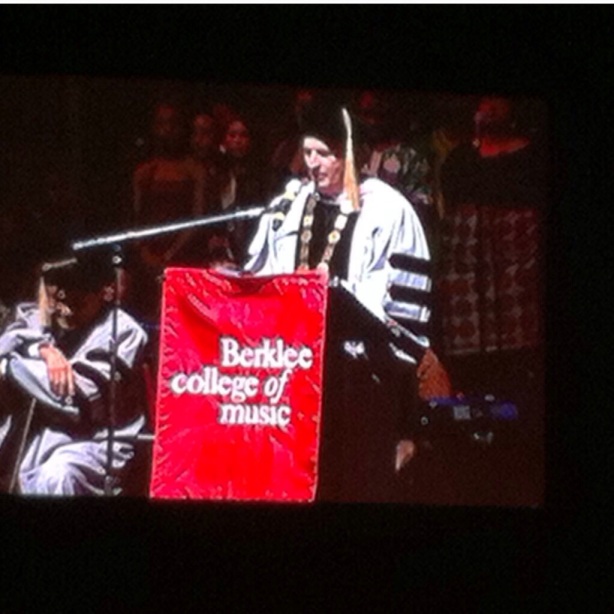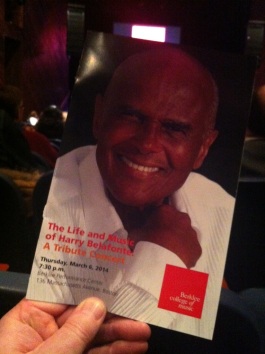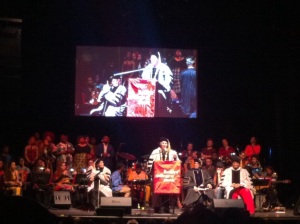Great love fest and concert last night for the ever-dignified and charismatic Harry Belafonte, the “High School drop out getting an Honorary Degree from Berklee.” At the age of 87, Belafonte stopped singing in public a few years ago,though you could spot him in the finale at least mouthing the words to “We Are the World,” the 1980s megahit for African famine relief that Belafonte brought in to being.

Moments before awarded Harry Belafonte his honorary doctorate, Berklee President Roger Brown speaks about his remarkable career.
That’s just one of an incredible list of accomplishments recited by Berklee president Roger Brown before conferring an honorary Doctor of Music to the singer, songwriter, and activist, who noted that “Belafonte” literally translates as “fountain of beautiful things.” The tone and feel-good vibe of the event (not to mention some incredible performances by Berklee students) is nicely summarized in today’s Boston Globe:
No artist has worked harder on behalf of truth and social justice than Belafonte. He bailed out Martin Luther King Jr. from a Birmingham, Ala., jail; was John F. Kennedy’s cultural ambassador to the Peace Corps; and helped raise more than $50 million for humanitarian aid in Africa by organizing the recording of “We Are the World.”
That is how the current generation of Berklee College of Music students knows the singer, said Larry Watson, the professor who produced the show, introducing a rousing encore of the song. But to an earlier generation — long before Michael Jackson crowned himself the King of Pop — Belafonte was the “King of Calypso.” He was the first recording artist to sell a million copies of a single album, and he had enduring hits with “Matilda” and “The Banana Boat Song” (that’s “Day O” to fans of “Beetlejuice” or “The Muppet Show”), both of which were part of the program presented by four dozen or so colorfully attired students.
When it came time for Belafonte to speak, he was his usual poignant, gripping, and humorous self, recalling the first time he went onstage to sing at a jazz club in New York. The great jazz pianist Al Haig had agreed to let him work up a short set of standards, beginning with “Pennies from Heaven.” But, when the moment came, Belafonte recalled, “Up jumped Max Roach to sit behind the drums. And then Tommy Potter picked up a bass. Charlie Parker sat down with his sax. So I looked around at my backup band. And I haven’t looked back since.”




You must be logged in to post a comment.